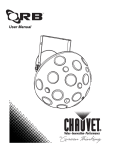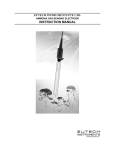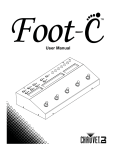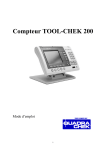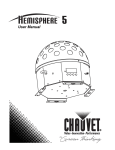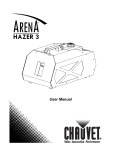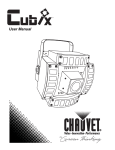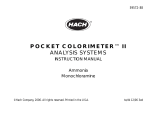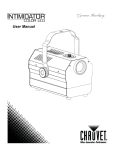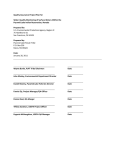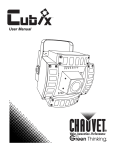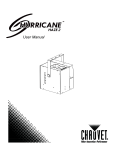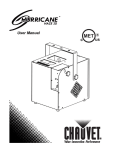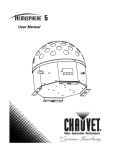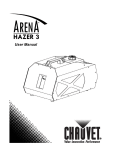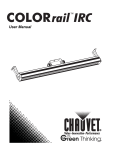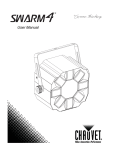Download Chauvet TriShot LED User manual
Transcript
User Manual TABLE OF CONTENTS 1. Before you Begin ............................................................................. 3 What is Included............................................................................................ 3 Unpacking Instructions .................................................................................. 3 Text Conventions .......................................................................................... 3 Icons .............................................................................................................. 3 Safety Notes .................................................................................................. 4 2. Introduction ...................................................................................... 5 Product Overview .......................................................................................... 5 Product Dimensions ...................................................................................... 6 3. Setup ................................................................................................. 7 AC Power ...................................................................................................... 7 Mounting ....................................................................................................... 8 4. Operation .......................................................................................... 9 Configuration (DMX) ..................................................................................... 9 Configuration (Standalone Modes) ............................................................... 9 DMX Channel Assignments and Values ..................................................... 11 5. Technical Information.................................................................... 12 General Maintenance .................................................................................. 12 General Troubleshooting ............................................................................ 13 Returns Procedure ...................................................................................... 14 Claims ......................................................................................................... 14 Contact Information ..................................................................................... 14 DMX Primer ................................................................................................. 15 6. Technical Specifications ............................................................... 18 Document Information The information and specifications contained in this document are subject to change without notice. CHAUVET® assumes no responsibility or liability for any errors or omissions that may appear in this manual. © Copyright 2011 CHAUVET®. All rights reserved Printed in P.R.C. Electronically published by CHAUVET® in the United States of America Page 2 of 18 Author Editor Manager PD Manager A. Chiappone R. Jones A. Reiss F. Sellers TriShot™ LED User Manual (Rev. 01a) 1. BEFORE YOU BEGIN What is Included 1 x TriShot™ LED 1 x Warranty Card 1 x User Manual Unpacking Instructions Immediately upon receiving this product, carefully unpack it and check the container in which you received it. Make sure that you have received all the parts indicated above and that they are all in good condition. If the material inside the container (this product and any other accessory included with it) appears damaged from shipping, or if the container shows signs of mishandling, notify the shipper immediately. In addition, retain the container and all the packing material for inspection. See the Claims section in the “Technical Information” chapter. Text Conventions Convention [10] <Menu> 1~512 50/60 Settings Menu > Settings Meaning A DIP switch to be configured A key to be pressed on the fixture’s control panel A range of values A set of values of which only one can be chosen A menu option not to be modified (for example, showing the operating mode/current status) A sequence of menu options to be followed ON A value to be entered or selected Icon Meaning Icons This paragraph contains critical installation, configuration, or operation information. Failure to comply with this information may render the fixture partially or completely inoperative, cause damage to the fixture, or cause harm to the user. This paragraph contains important installation or configuration information. Failure to comply with this information may prevent the fixture from functioning correctly. This paragraph reminds you of useful, although not critical, information. Product at a Glance Use on Dimmer Outdoor Use Sound Activated DMX Master/Slave TriShot™ LED User Manual (Rev. 01a) Auto Programs Auto-ranging Power Supply Replaceable Fuse User Serviceable Duty Cycle Page 3 of 18 Safety Notes Please read the following notes carefully because they include important safety information about the installation, usage, and maintenance of this product. Page 4 of 18 Keep this User Manual for future consultation. If you sell this product to another user, be sure that they also receive this document. Always make sure that the voltage of the outlet to which you are connecting this product is within the range stated on the decal or rear panel of the fixture. This product is for indoor use only! To prevent risk of fire or shock, do not expose this fixture to rain or moisture. Make sure there are no flammable materials close to the unit while operating. Always install this product in a location with adequate ventilation, at least 20 in (50 cm) from adjacent surfaces. Be sure that no ventilation slots on the unit’s housing are blocked. Always disconnect this product from the power source before cleaning it or replacing the fuse. Make sure to replace the fuse with another of the same type and rating. If mounting this product overhead, always secure it to a fastening device using a safety cable. The maximum ambient temperature (Ta) is 104° F (40° C). Do not operate this product at higher temperatures. In the event of a serious operating problem, stop using the unit immediately. Never try to repair this product. Repairs carried out by unskilled people can lead to damage or malfunction. Please contact the nearest authorized technical assistance center. Never connect this product to a dimmer pack. Make sure the power cord is not crimped or damaged. Never disconnect the power cord by pulling or tugging on the cord. Never carry a fixture from the power cord or any moving part. Always use the hanging/mounting bracket or the handles. Always avoid direct eye exposure to the light source when this fixture is on. TriShot™ LED User Manual (Rev. 01a) 2. INTRODUCTION Product Overview . Focus adjustment DMX out DIP switches Microphone Sensitivity Bracket adjustment knob Safety Fuseholder DMX in Power in (hardwired) TriShot™ LED User Manual (Rev. 01a) Page 5 of 18 Product Dimensions Page 6 of 18 TriShot™ LED User Manual (Rev. 01a) 3. SETUP AC Power This product has an auto-ranging power supply and it can work with an input voltage range of 100~240 VAC, 50/60 Hz. To determine the power requirements for a particular fixture, see the label affixed to the back plate of the fixture or refer to the fixture’s specifications chart. A fixture’s listed current rating indicates its average current draw under normal conditions. Always connect this product to a protected circuit (circuit breaker or fuse), making sure that it has an appropriate electrical ground to avoid the risk of electrocution or fire. Never connect this product to a rheostat (variable resistor) or dimmer circuit, even if the rheostat or dimmer channel serves only as a 0 to 100% switch. TriShot™ LED User Manual (Rev. 01a) Page 7 of 18 Mounting Orientation The TriShot™ LED may be mounted in any position, provided there is adequate room for ventilation around it. Rigging Be sure that the structure onto which you are mounting this product can support its weight. Please see the “Technical Specifications” section of this manual for weight information. Make sure to mount the fixture securely to a rigging point, whether an elevated platform or a truss. When rigging this product onto a truss, you should use a mounting clamp of appropriate weight capacity. The bracket has a 13 mm hole, which is appropriate for this purpose. When mounting this product overhead, always use a safety cable. Before deciding on a location for this product, always make sure that it will be easy to access the unit for maintenance and programming purposes. The bracket knobs allow for directional adjustment when aiming the fixture to the desired angle. Only loosen or tighten the bracket knobs using your bare hands. Using tools could damage the knobs. Hanging bracket Mounting Diagram Bracket knob Page 8 of 18 TriShot™ LED User Manual (Rev. 01a) 4. OPERATION Configuration (DMX) Set this product in DMX mode to control it with a DMX controller. 1) Connect this product to a suitable power outlet. 2) Turn this product on. 3) Connect a DMX cable from the DMX output of the DMX controller to the DMX input socket of this product. Starting Address When selecting a starting DMX address, always consider the number of DMX channels the selected DMX mode uses. If you choose a starting address that is too high, you could restrict the access to some of the fixture’s channels. The TriShot™ LED uses seven DMX channels, which defines the highest configurable address to 506. If you are not familiar with the DMX protocol, you may refer to the “DMX Primer” section in the “Technical Information” chapter. To select the starting address, do the following: 1) Set DIP switch [10] to the OFF position. 2) Use DIP switch [1~9] to set the DMX starting address. Configuration (Standalone Modes) Set this product in one of the standalone modes to control it without a DMX controller. 1) Connect this product to a suitable power outlet. 2) Turn this product on. Sound Active Mode To enable the Sound Active mode, do the following: 1) Set DIP switch [10] to the ON position. 2) Turn the music on and adjust the microphone sensitivity knob until the fixture starts reacting to the beat of the music. The fixture will only respond to the low frequencies of the music (bass and drums). Automatic Mode Never connect a fixture that is operating in any standalone mode, whether Static, Automatic, or Sound to a DMX string connected to a DMX controller. This is because fixtures in standalone mode may transmit DMX signals that could interfere with the DMX signals from the controller. To enable the Automatic Mode, follow the instructions below: 1) Set DIP switch [7, 9, 10] to the ON position. 2) Use DIP switch [1~6] to increase the operating speed. You may combine DIP switch [1~6] to reach higher speeds. The higher the number of the DIP switch, the more it will increase the operating speed. TriShot™ LED User Manual (Rev. 01a) Page 9 of 18 Static Colors To enable the Static Colors mode, do the following: 1) Set DIP switch [8, 9, 10] to the ON position. 2) Use DIP switch [1~6] to set the color. See the chart below to see what color each DIP switch controls. Red [1, 2] Green [3, 4] Blue [5, 6] You may combine DIP switch for same color to increase the intensity. Master/Slave Mode This mode allows a single TriShot™ LED unit (the “master”) to control the actions of one or more TriShot™ LED units (the “slaves”) without the need of a DMX controller. The master unit will be set to operate in either Automatic or Sound Active mode, while the slave units will be set to operate in Slave Mode. Once set and connected, the slave units will operate in unison with the master unit. Configure the units as indicated below. Slave units: 1) Set DIP switch [2~10] to the OFF position. 2) Set DIP switch [1] to the ON position. 3) Connect the DMX input of the first slave unit to the DMX output of the master unit. 4) Connect the DMX input of the subsequent slave units to the DMX output of the previous slave unit. 5) Finish setting and connecting all the slave units. Master unit: 1) Set the master unit to operate in either Automatic or Sound mode, as previously indicated. 2) Make the master unit the first unit in the DMX daisy chain. Page 10 of 18 Configure all the slave units before connecting the master unit to the DMX daisy chain. Never connect a DMX controller to a DMX string configured for Master/Slave operation because it may interfere with the signals from the master unit. Do not connect more than 31 slave units to the master unit. TriShot™ LED User Manual (Rev. 01a) DMX Channel Assignments and Values 7-CH Channel Function 1 2 3 Red Green Blue 4 Color Macros 5 Speed (CH.6 between 032~223) Strobe (channels 1~4 only) Value 000 255 000 255 000 255 000 009 010 255 Dimmer (0~100%) Dimmer (0~100%) Dimmer (0~100%) No function Strobe (slow~fast) 000 255 Slow~fast 000 015 016 255 No function Slow~fast (6~18 Hz) RGB mode Pulse effect 0%~100% (using RGB faders) Pulse effect 100%~0% (using RGB faders) Pulse effect 100%~0%~100% (using RGB faders) Auto fade transition Auto snap transition (3 colors) Auto snap transition (7 colors) Sound triggering mode Intensity (RGB/Macro modes): 0%~100% 6 Operating mode (when CH.6 is set between 032~223, CH.5 controls the speed) 000 031 032 063 064 095 096 127 128 159 160 191 192 223 224 255 7 Dimmer 000 255 TriShot™ LED User Manual (Rev. 01a) Setting Page 11 of 18 5. TECHNICAL INFORMATION General Maintenance Dust build up reduces light output performance and can cause overheating. This can lead to reduction of the light source’s life. To maintain optimum performance and minimize wear, you should clean your lighting fixtures at least twice a month. However, be aware that usage and environmental conditions could be contributing factors to increase the cleaning frequency. To clean this fixture, follow the instructions below: Unplug the fixture from power. Wait until the fixture is cold. Use a vacuum (or dry compressed air) and a soft brush to remove dust collected on the external surface/vents. Clean all external optics and glass surfaces with a mild soap solution, ammoniafree glass cleaner, or isopropyl alcohol. Apply the solution directly to a soft, lint free cotton cloth or a lens cleaning tissue. Softly drag any dirt or grime to the outside of the glass surface. Gently polish the external glass surfaces until they are free of haze and lint. Always dry the external glass surfaces carefully after cleaning them. Page 12 of 18 TriShot™ LED User Manual (Rev. 01a) General Troubleshooting Symptom Circuit breaker or fuse keeps blowing Product does not power up Possible Cause Possible Action Excessive load on the circuit Make sure that the total load does not exceed 80% of the breaker or fuse nominal current Short circuit along the power lines Check the power lines and power cords No energy on power outlet Check power outlet Change to another outlet Loose or damaged power cord Check the power cord Blown fuse Replace blown fuse with a good one of the same type and rating Internal problem Send product for repair Wrong starting address on the fixture Set the correct starting address on the fixture Use the right fader(s) on the controller Fixture does not respond to DMX Wrong DMX personality on the fixture Set the correct DMX fixture’s personality Assign the faders accordingly Wrong polarity setting on the DMX controller Change the signal polarity on the controller Loose or damaged DMX cable Check the DMX cable before the faulty unit Internal problem Send product for repair Signal cables are not DMX compatible Replace non DMX cables with true DMX cables Interference with AC or radio signals Keep DMX cables away from AC wires or radio equipment DMX cable too long Install an optically coupled DMX amplifier right before the fixture with intermittent problems Too many fixtures connected Install an optically coupled DMX amplifier after unit #32 Terminator not connected Install a terminator, as indicated in the “DMX Primer” section. Intermittent DMX Problems If you still experience problems after trying the above solutions, contact CHAUVET® Technical Support. TriShot™ LED User Manual (Rev. 01a) Page 13 of 18 Returns Procedure The user must send the merchandise prepaid, in the original box, and with its original packing and accessories. CHAUVET® will not issue call tags. Call CHAUVET® and request a Return Merchandise Authorization Number (RMA #) before shipping the fixture. Be prepared to provide the model number, serial number, and a brief description of the cause for the return. The user must clearly label the package with a Return Merchandise Authorization Number (RMA #). CHAUVET® will refuse any product returned without an RMA #. DO NOT write the RMA # directly on the box. Instead, write it on a properly affixed label. Once you have received the RMA #, please include the following information on a piece of paper inside the box: Your name Your address Your phone number The RMA # A brief description of the problem Be sure to pack the fixture properly. Any shipping damage resulting from inadequate packaging will be the customer’s responsibility. As a suggestion, proper UPS packing or double-boxing is always a safe method to use. CHAUVET® reserves the right to use its own discretion to repair or replace returned product(s). Claims The carrier is responsible for any damage incurred during shipping to this product or any part that shipped with it. Therefore, if the received merchandise appears to have damages caused during shipping, the customer must submit the damage report and any related claims with the carrier, not CHAUVET®. The customer must submit the report upon reception of the damaged merchandise. Failure to do so in a timely manner may invalidate the customer’s claim with the carrier. For other issues such as missing components or parts, damage not related to shipping, or concealed damage, the customer must make claims to CHAUVET® within seven (7) days of receiving the merchandise. Contact Information World Headquarters United Kingdom & Ireland CHAUVET® CHAUVET® Europe Ltd. General Information Address: Voice: Fax: Toll free: General Information 5200 NW 108th Avenue Sunrise, FL 33351 (954) 929-1115 (954) 929-5560 (800) 762-1084 Technical Support Voice: Fax: (954) 929-1115 (Press 4) (954) 756-8015 World Wide Web Voice: Fax: Email: Unit 1C Brookhill Road Industrial Estate Pinxton, Nottingham, UK NG16 6NT +44 (0)1773 511115 +44 (0)1773 511110 uktech@chauvetlighting.com World Wide Web www.chauvetlighting.com Page 14 of 18 Address: www.chauvetlighting.co.uk TriShot™ LED User Manual (Rev. 01a) DMX Primer The USITT DMX512-A data transmission protocol (DMX, from now on) is based on the EIA-485 standard and it has 512 channels (001 to 512). This system requires a controller (DMX controller), one or more DMX compatible fixtures, and a DMX circuit (also known as “DMX universe”) to link the fixtures to the controller. Depending on their complexity and features, DMX compatible fixtures may require from one to more than 30 DMX channels to operate. Some DMX fixtures have multiple operation modes (also known as “personalities”), each with its own number of channels and controllable parameters. Starting Address In the DMX system, the controller sends DMX data to each fixture based on the fixture’s starting address. The starting address is the number of the DMX channel (001 to 512) assigned to the fixture’s first control channel (Channel 1). When assigning starting addresses to multiple fixtures, it is critical to ensure that no starting address is already in use by another fixture to prevent channels from overlapping. Otherwise, the affected fixtures may operate erratically. For instance, a user has two DMX compatible fixtures. Fixture “A” has four channels and fixture “B” has six channels. If the user configures the starting address of fixture “A” to “001”, channels 001 through 004 on the DMX controller will control fixture “A”. This means that the user should assign the starting address of fixture “B” to “005” or higher. For a starting address of “005”, the DMX controller would use channels 005 to 010 to control fixture “B”. It is possible to control multiple fixtures of the same type by assigning each one of them the same starting address. In this case, all the fixtures would respond in unison (synchronized) to the signals from the DMX controller. Fixture Linking (Daisy Chain) DMX compatible fixtures receive the control signals from the DMX controller through the DMX cables. Each fixture has a DMX In and a DMX Out connector. The figure to the right illustrates how the fixtures link to each other using multiple segments of DMX cable in a sequential format called “daisy chain”. The order in which the fixtures connect to the DMX controller is irrelevant because all fixtures receive the same DMX signals and they only respond to them based on their individual starting addresses. However, it is important to notice that the connections between fixtures should always be as short and direct as possible. To ensure the integrity of the DMX signal, follow the recommendations of the EIA-485 standard: DMX Controller 1st DMX Fixture 2nd DMX Fixture To other fixtures The maximum recommended cable length is 500 m (1,640 feet). The maximum recommended number of fixtures on the same daisy chain is 32. Connecting more than 32 fixtures on one daisy chain without the use of a DMX optically-isolated splitter may result in deterioration of the digital DMX signal. TriShot™ LED User Manual (Rev. 01a) Page 15 of 18 DMX Cabling The DMX protocol requires using special data cables to accommodate for the high speed digital signals it uses. Despite their apparent similarities, data cables are electrically different from standard microphone cables because they can carry high frequency digital signals and have better protection against electromagnetic interference. You can purchase CHAUVET® certified DMX cables directly from a dealer/distributor or make your own DMX cable. If you choose to make your own DMX cable, you must use a data-grade cable such as the Belden 9841, which has the following electrical characteristics: Type: Maximum capacitance between conductors: Maximum capacitance between conductor and shield: Maximum resistance: Nominal impedance: shielded, 2-conductor twisted pair 30 pF/ft 55 pF/ft 20 ohms/1000 ft 100~140 ohms DMX Connectors Each DMX cable must have a male XLR connector on one end and a female XLR connector on the other end. The DMX protocol indicates that the XLR connectors must have five pins. However, most lighting fixtures use the 3-pin XLR connector. The pin assignment of the 3-pin and 5-pin XLR connectors in a DMX cable is as follows: Female Plug Male Plug Signal 3-Pin 5-Pin 5-Pin 3-Pin Signal Common 1 1 1 1 Common Data - 2 2 2 2 Data - Data + 3 3 3 3 Data + Not used 4 4 Not used Not used 5 5 Not used You can use the above table to create a 3-pin/3-pin cable, a 5-pin/5-pin cable, or a 3pin to 5-pin adapter. The DMX daisy chain uses a terminator to reduce signal transmission problems, especially with long cables. The terminator consists of either a 3-pin or 5-pin XLR male plug with a 120 Ω, ¼ W resistor connected to the wire side of pins 2 and 3, as shown below. The terminator plug connects to the DMX Out socket of the last DMX fixture in the daisy chain. Do not allow the common wire of the DMX cable to touch the fixture’s chassis ground. This could cause a ground loop, which may affect your fixtures’ performance. Test all DMX cables with an ohmmeter to verify the correct polarity of the wires, and to make sure that they are not touching the shield or each other. Page 16 of 18 TriShot™ LED User Manual (Rev. 01a) DIP Switch Reference Guide You can use the table below to set your fixture’s DIP switches. Imagine that you want to find the DIP switch settings for DMX address 328: 1) Find 328 among the addresses from the table and point at it with your finger. 2) Move your finger to the left and you will find the settings for DIP Switches 1 to 5. DIP Switches 1, 2, 3, and 5 are Off (0), while DIP Switch 4 is On (1). 3) Go back and point at the 328 address. 4) Move your finger upward and you will find the settings for DIP Switches 6 to 9. DIP Switches 6 and 8 are Off (0), while DIP Switches 7 and 9 are On (1). 5) See below how the DIP Switches will look after configuring them. #9 #8 #7 #6 #1 #2 #3 #4 #5 DIP Switches 0 = Off 1=Off 0 1 0 1 0 1 0 1 0 1 0 1 0 1 0 1 0 1 0 1 0 1 0 1 0 1 0 1 0 1 0 1 0 0 1 1 0 0 1 1 0 0 1 1 0 0 1 1 0 0 1 1 0 0 1 1 0 0 1 1 0 0 1 1 0 0 0 0 1 1 1 1 0 0 0 0 1 1 1 1 0 0 0 0 1 1 1 1 0 0 0 0 1 1 1 1 0 0 0 0 0 0 0 0 1 1 1 1 1 1 1 1 0 0 0 0 0 0 0 0 1 1 1 1 1 1 1 1 TriShot™ LED User Manual (Rev. 01a) 0 0 0 0 0 0 0 0 0 0 0 0 0 0 0 0 1 1 1 1 1 1 1 1 1 1 1 1 1 1 1 1 0 0 0 0 0 0 0 0 1 1 1 1 1 1 1 1 0 0 0 0 1 1 1 1 0 0 0 0 1 1 1 1 0 0 1 1 0 0 1 1 0 0 1 1 0 0 1 1 0 1 0 1 0 1 0 1 0 1 0 1 0 1 0 1 320 321 322 323 324 325 326 327 328 329 330 331 332 333 334 335 336 337 338 339 340 341 342 343 344 345 346 347 348 349 350 351 352 353 354 355 356 357 358 359 360 361 362 363 364 365 366 367 368 369 370 371 372 373 374 375 376 377 378 379 380 381 382 383 384 385 386 387 388 389 390 391 392 393 394 395 396 397 398 399 400 401 402 403 404 405 406 407 408 409 410 411 412 413 414 415 416 417 418 419 420 421 422 423 424 425 426 427 428 429 430 431 432 433 434 435 436 437 438 439 440 441 442 443 444 445 446 447 448 449 450 451 452 453 454 455 456 457 458 459 460 461 462 463 464 465 466 467 468 469 470 471 472 473 474 475 476 477 478 479 480 481 482 483 484 485 486 487 488 489 490 491 492 493 494 495 496 497 498 499 500 501 502 503 504 505 506 507 508 509 510 511 DMX Address ----1 2 3 4 5 6 7 8 9 10 11 12 13 14 15 16 17 18 19 20 21 22 23 24 25 26 27 28 29 30 31 32 33 34 35 36 37 38 39 40 41 42 43 44 45 46 47 48 49 50 51 52 53 54 55 56 57 58 59 60 61 62 63 64 65 66 67 68 69 70 71 72 73 74 75 76 77 78 79 80 81 82 83 84 85 86 87 88 89 90 91 92 93 94 95 96 97 98 99 100 101 102 103 104 105 106 107 108 109 110 111 112 113 114 115 116 117 118 119 120 121 122 123 124 125 126 127 128 129 130 131 132 133 134 135 136 137 138 139 140 141 142 143 144 145 146 147 148 149 150 151 152 153 154 155 156 157 158 159 160 161 162 163 164 165 166 167 168 169 170 171 172 173 174 175 176 177 178 179 180 181 182 183 184 185 186 187 188 189 190 191 192 193 194 195 196 197 198 199 200 201 202 203 204 205 206 207 208 209 210 211 212 213 214 215 216 217 218 219 220 221 222 223 224 225 226 227 228 229 230 231 232 233 234 235 236 237 238 239 240 241 242 243 244 245 246 247 248 249 250 251 252 253 254 255 256 257 258 259 260 261 262 263 264 265 266 267 268 269 270 271 272 273 274 275 276 277 278 279 280 281 282 283 284 285 286 287 288 289 290 291 292 293 294 295 296 297 298 299 300 301 302 303 304 305 306 307 308 309 310 311 312 313 314 315 316 317 318 319 Page 17 of 18 6. TECHNICAL SPECIFICATIONS Dimensions and Weight Length Width Height Weight 8.6 in (218 mm) 5.2 in (131 mm) 6.7 in (171 mm) 2.6 lbs (1.2 kg) Note: Dimensions in inches rounded to the nearest decimal digit. Power Power Supply Type Range Voltage Selection Switching (internal) 100~240 V, 50/60 Hz Auto-ranging Parameter 120 V, 60 Hz 230 V, 50 Hz Consumption 17 W (0.15 A) 20 W (0.09 A) Output Power I/O Input Connectors IEC N/A Cord plug Edison N/A Type Power Lifespan LED 3W 50,000 hours Color Quantity Current Tri-color 1 350 mA Light Source Photo Optic Parameter Illuminance @ 1 m 1,592 lx Illuminance @ 2 m 305 lx Beam angle 11º Maximum External Temp. Cooling System 104° F (40° C) Convection I/O Connectors Connector Type Channel Range 3-pin XLR Sockets 7 Thermal DMX Ordering TriShot™ LED TRISHOTLED Page 18 of 18 TriShot™ LED User Manual (Rev. 01a)


















